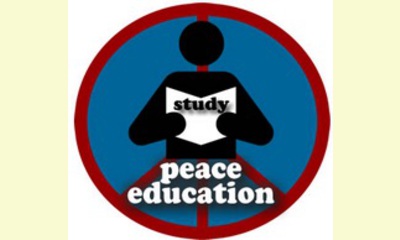|
|
Where in the World to Study Peace Education? Help us Build a Global Directory
un articulo por Global Campaign for Peace Education
There is a growing demand for peace education, yet few know
of the learning opportunities that exist for gaining knowledge,
developing capacities, and building the fundamental
pedagogical skills for teaching peace. To address this lack of
availability of information, the Global Campaign for Peace
Education, in partnership with the International Institute on
Peace Education and the National Peace Academy, is
conducting a survey to inventory programs, courses, and
workshops in peace education. Click here to take part in the survey. 
click on photo to enlarge
We need your help to build this inventory. If you are running a
program, teaching a course, or are currently a student studying
peace education, or have the necessary information about such
a program, please take a few moments to complete our online
form. We are interested in gathering information about current
formal (university based), informal (conferences, non-university
based trainings) and non-formal (independent, citizen-based)
programs of study and ongoing trainings and workshops.
Preliminary results will be published in April.
There is already sufficiently rich data related to peace studies
programs, thus for this survey we are seeking to gather
information specifically related to peace education
programming. Elements specific to education, teaching and/or
learning should be prominent in the courses that are submitted.
Peace education programming might be broken down into two
broad categories 1) the study of education (systems, philosophy,
pedagogy) and its role in building peace, and 2) teacher and
learning facilitator training and preparation in peace education
(theory, methodology, pedagogy). More simply stated, these
categories are 1) the study of peace education and 2)
preparation for the practice of peace education.
Programs, courses and trainings in these areas might include -
but are not limited to - study of the philosophy of education,
critical pedagogy, democratic education / citizenship education,
emergency education, critical race theory, urban education,
social justice education, restorative practices, conflict resolution
(and mediation) education, development studies, human rights
education and learning, gender equity and equality and women’s
empowerment.
In general, we are interested in courses oriented towards adult
learners or educators, not programs offered directly to students
in schools.
(Thank you to the Newsletter of the Global Campaign for Peace
Education for this article.)
|








|
DISCUSSION
Pregunta(s) relacionada(s) al artículo :
Higher education for peace, How can young people find support for their studies?
* * * * *
Comentario más reciente:
:
The Michigan, USA Chapter of Veterans For Peace (Chapter 93) has a "Peace Studies Scholarship" for those from Michigan who are studying peace at an institution of higher education.

|
|









